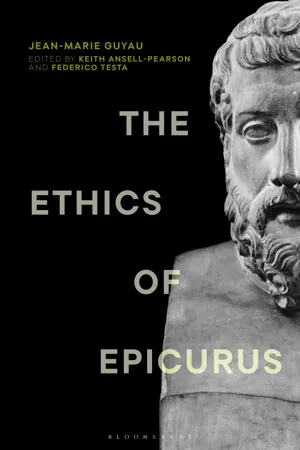
The Ethics of Epicurus and its Relation to Contemporary Doctrines
- 304 pages
- English
- ePUB (mobile friendly)
- Available on iOS & Android
The Ethics of Epicurus and its Relation to Contemporary Doctrines
About this book
This is the first English translation of a compelling and highly original reading of Epicurus by Jean-Marie Guyau. This book has long been recognized as one of the best and most concerted attempts to explore one of the most important, yet controversial ancient philosophers whose thought, Guyau claims, remains vital to modern and contemporary culture. Throughout the text we are introduced to the origins of the philosophy of pleasure in Ancient Greece, with Guyau clearly demonstrating how this idea persists through the history of philosophy and how it is an essential trait in the Western tradition. With an introduction by Keith Ansell-Pearson and Federico Testa, which contextualizes the work of Guyau within the canon of French thought, and notes on both further reading and on Epicurean scholarship more generally, this translation also acts as a critical introduction to the philosophy of Guyau and Epicurus.
Tools to learn more effectively

Saving Books

Keyword Search

Annotating Text

Listen to it instead
Information
1
Pleasure: The End of Life and the Principle of All Ethics
Table of contents
- Cover
- Half-Title Page
- Series Page
- Title Page
- Contents
- Note on the Translation
- Editors’ Introduction: Jean-Marie Guyau on Epicurus and the Art of Living: A Novel Approach to the History of Philosophy
- Foreword: On the Method Used for the Exposition of Systems
- Introduction: Epicureanism in Antiquity and Modernity
- Book One: The Pleasures of the Flesh
- 1 Pleasure: The End of Life and the Principle of All Ethics
- 2 Fundamental Pleasure: The Stomach
- 3 The Rule of Pleasure: Utility. – Happiness, The Sovereign Good
- 4 Desire – The Ultimate End of Desire: Rest, Enjoyment of Self
- Book Two: The Pleasures of the Soul
- 1 Intellectual and Moral Serenity – Science, Opposed by Epicurus to the Idea of Miracle
- 2 Freedom – Contingency in Nature, the Condition of Human Freedom
- 3 Tranquillity in the Face of Death. – Epicurean Theory of Death, and its Relation to Contemporary Theories
- Book Three: Private and Public Virtues
- 1 Courage and Temperance. Love and Friendship. The Genesis of Friendship. The Conduct of the Sage in Human Society
- 2 Justice and Social Contract
- 3 Progress in Humanity
- 4 Epicurean Piety. The Struggle against Divinity understood as Efficient Cause
- Conclusion: Epicureanism and its Analogies with Modern Positivism. The Success of Epicureanism in Antiquity
- Book Four: The Modern Successors of Epicurus
- 1 The Epoch of Transition Between Ancient Epicureanism and Modern Epicureanism – Gassendi and Hobbes
- 2 La Rochefoucauld – The Psychology of Epicureanism
- 3 Spinoza – Synthesis of Epicureanism and Stoicism
- 4 Helvétius
- 5 The Spirit of Epicureanism in Eighteenth-Century France
- Conclusion: Contemporary Epicureanism
- Bibliography
- Index of Names
- Index of Subjects
- Copyright
Frequently asked questions
- Essential is ideal for learners and professionals who enjoy exploring a wide range of subjects. Access the Essential Library with 800,000+ trusted titles and best-sellers across business, personal growth, and the humanities. Includes unlimited reading time and Standard Read Aloud voice.
- Complete: Perfect for advanced learners and researchers needing full, unrestricted access. Unlock 1.4M+ books across hundreds of subjects, including academic and specialized titles. The Complete Plan also includes advanced features like Premium Read Aloud and Research Assistant.
Please note we cannot support devices running on iOS 13 and Android 7 or earlier. Learn more about using the app